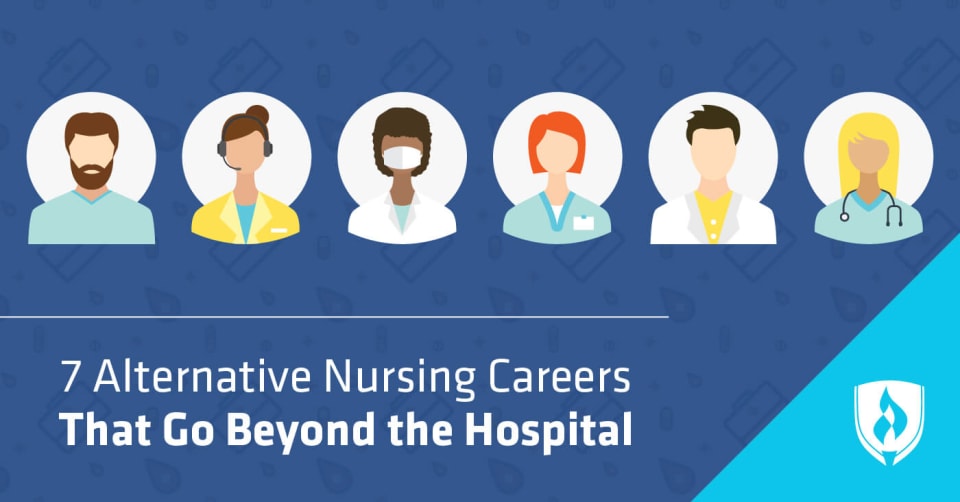When you hear the word “nursing,” you may conjure up images of someone in scrubs, hurrying from patient to patient in a hospital. And while you have considered nursing as a career, this image doesn’t seem to align with your own goals and passions. You are interested in healthcare, but either don’t want to work in hands-on care, or you’d like to help more people than just day-to-day patients.

We’ve got you covered. Nursing is a huge field experiencing tremendous growth—in fact, the U.S. Bureau of Labor Statistics predicts nursing employment to grow 16 percent by 2024—much faster than the national average. As the field grows, it also changes, with opportunities extending outside the hospital and even beyond wearing scrubs. A traditional nursing career is now not the only way you can take advantage of a Nursing degree in the growing healthcare industry.
We talked to real RNs, did our research and dug up seven alternative nursing careers you might not have known existed. Who knows? Maybe one of these could be your future career!
Alternative nursing careers you may not know about
1. Public health nurse
A public health nurse is one who works in a county or state health department, correctional facility or in businesses to help monitor and control any health or safety issue. They provide screening tests as well as administer immunizations. Public health nurses also work to educate populations on topics of health and well-being.
The education for a public health nurse ranges. You can have a Nursing Diploma, Associate’s Degree in Nursing (ADN) or Bachelor of Science in Nursing (BSN). You can then go on to get a graduate degree and pass an exam to become an Advanced Public Health Nurse.
2. School nurse
If you are still interested in the hands-on aspect of nursing, a position as a school nurse may suit you. School nurses work with children of varying ages—from early childhood to high school-aged—and administer care as needed. Among their tasks include educating students on various health topics, dispensing medication per doctor’s orders, treating minor injuries such as sprains and cuts and providing preventative screening services.
The role of school nurse is perfect for the nurse who wants to work more traditional hours, as well as get a break in summer. To become a school nurse, you will need to earn a BSN and be a registered nurse.
3. Nurse educator
With the nation-wide need for qualified nurses also comes a demand for those who help prepare students to become nurses. Nurse educators work in colleges and universities to teach clinical and classroom knowledge to nursing students. In addition, nurse educators may work in inpatient and outpatient healthcare facilities, educating and orienting new nurses and nursing aides. Being a nurse educator gives you the flexibility to choose how much time you’d like to spend in a clinical setting.
As a nurse educator, you will be tasked with teaching and guiding potential new nurses on their healthcare journey and will need as many nursing skills as possible. This means nurse educators need to be registered nurses, with many positions at colleges and universities requiring a Master of Science in Nursing.
4. Nurse life-care planner
RNs who work in hospitals or care facilities normally work with doctors or nurse practitioners to create short term care plans for their patients. Nurse life care planners, on the other hand, are qualified to create long-term care plans for patients who suffer from severe illnesses or injuries. Nurse life-care planners work with insurance companies, doctors, lawyers and whomever else is needed to make decisions on the prospective costs and needs of the appropriate medical care.
Many nurse life-care planners are registered nurses. After two years of working in a nursing position that involves providing long-term care and treatment, nurses have the option of obtaining continuing education to become a certified nurse life-care planner (CNLCP).
5. Home health nurse
Home health is a growing field of nursing. Home health nurses are needed to assist patients who have returned home from a surgery, are recovering from an illness or injury, or who are disabled or terminally ill. Nurses provide short-term and long-term care and complete many of the same tasks a nurse working in a hospital: Wound care, medication administration, patient assessment and other specified duties that will vary by patient.
6. Telemedicine nurse
Telemedicine nursing combines technology and nursing to provide care to patients; nurses use video and computers to connect with patients who live remotely, have chronic conditions that need to be monitored, or patients who are unable to come into a clinic.
“Many home health agencies have telemedicine departments that utilize telemedicine with the routine monitoring of some of their patients,” says Susan E. Lowey, PhD, RN, CHPN, in her book, Nursing Beyond the Bedside. “Telemedicine nurses should be knowledgeable about the use of technology to deliver care to patients.”
Nurses who are interested in telemedicine should be registered nurses and have a few years’ experience working as a nurse, preferably in home health or ambulatory care, and an interest in technology. Already more than 70 percent of healthcare providers are using telemedicine tools, so nurses who have those technology skills will stand out.
7. Nursing informatics
Informatics nurses use health information systems to communicate and manage patient data. Kathleen Dorgan, RN and Director of IT Learning and Development at DaVita Kidney Care, says her goal is to help developers understand how clinicians will use this new technology in their daily workflow. This technical role has a huge impact on patient care.
“The more streamlined and intuitive our applications and training are, the more time we can give back to nurses and technicians to spend with their patients,” says Dorgan.
Anyone interested in nursing informatics should obtain a Bachelor of Science in Nursing and become an RN. Once you have a few years’ experience working in the field, you can obtain an informatics nursing certificate through the American Nurses Credentialing Center.
Go beyond the hospital
It’s time to ditch the scrubs—the days where nurses were limited to jobs in patient care are long gone. There are plenty of alternative careers for nurses to put their skills to good use outside the hospital walls.
Now is your chance to begin your career in healthcare by going off the beaten path. Learn more about earning your Nursing degree to begin your journey to one of these alternative careers for nurses.
RELATED ARTICLES:
- The 9 Types of Patients You’ll Care for as a Nurse
- A Beginner’s Guide to Understanding the Levels of Nursing
- What Makes a Good Nurse? Experts Reveal What It Takes
EDITOR’S NOTE: This article was originally published in April, 2015. It has since been updated to include information relevant to 2017. Insights from Kathleen Dorgan remain from original article.




